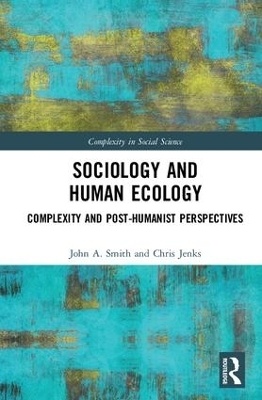
Sociology and Human Ecology
Routledge (Verlag)
978-1-138-23009-5 (ISBN)
Traditionally, Sociology has identified its subject matter as a distinct set – social phenomena – that can be taken as quite different and largely disconnected from potentially relevant disciplines such as Psychology, Economics or Planetary Ecology.
Within Sociology and Human Ecology, Smith and Jenks argue that this position is no longer sustainable. Indeed, exhorting the reader to confront human ecology and its relation to the physical and biological environments, Smith and Jenks suggest that the development of understanding with regards to the position occupied by the social requires, in turn, an extension of the component disciplines and methodologies of a ‘new’ human socio-ecology.
Aiming to evoke critical change to the possibility, status and range of the social sciences whilst also offering essential grounding for inter-disciplinary engagement, Sociology and Human Ecology will appeal to postgraduate students and postdoctoral researchers interested in fields such as Social Theory, Socio-Biology and Ecological Economics.
John A. Smith is a Principal Lecturer and Research Lead in the Department of Education & Community Studies at the University of Greenwich, UK Chris Jenks is a Sociologist, and has previously occupied the positions of Vice Chancellor and Principal of Brunel University London; and Pro-Vice Chancellor and Professor of Sociology at Goldsmiths College University of London, UK
Introduction
Chapter 1. Ontology from the perspective of complexity theory: auto-eco-organisation
Attention and ignorance
The dual character of ignorance: the standpoint of irony
The dual character of ignorance: pragmatism
The plurality of ignorance and ‘complexity’
Prigogine and systems far-from equilibrium
Morin: restricted and general complexity
Kauffmann and ‘the next adjacent possible’
Per Bak: Self-Organised Criticality
Conclusions and implications.
Post-script and transition: an informational turn
Chapter 2 The strengths and limitations of the concept of social construction
Marxism(s) and the Economy
Durkheim, organic solidarity and sui generic social phenomena.
The Normal & the Pathological
Weber, authority and power.
Weber and the Protestant Ethic
Foucault and post-structuralism
Reconciling Critical Realism and Social Construction
The Saussurean legacy
Conclusions and implications
Chapter 3. The ontological status of the living: a renewed foundation for epistemology and representation
Hoffmeyer and semiotic causality
Deely and biosemiotics
UexKull and the concept of the Umwelt
Autopoiesis and/or Dissipative Systems
Embodied cognition: a basic introduction
The Embodied Conceptualisation Hypothesis
The Replacement Hypothesis
The Constitution Hypothesis
J. and E. Gibson: a radical ecology of perceptual learning and development
Summary and extensions
Dennett: sufficiency, economy, distribution.
Conclusion, postscript and transition.
Chapter 4 Human cognition and development
The Standard Social Science Model (SSSM)
Evolutionary psychology
The Gibsons revisited: the ecology of perception and human development
Affordances reconsidered in the context of human development
Konnor et al: structures of human childhood
Infancy and altriciality
Puberty and adolescence
Affect theory: emotion and the realisation of the social
Kegan: ‘evolutionary balances’ and ‘orders of consciousness’.
Concluding comments: Stacey on Elias vs Freud
Chapter 5 The social, structure and the emotions
The sociological heritage
Forms of solidarity: Durkheim, Chance, TenHouten
Forms of solidarity: Douglas and Thompson
Anthropology and social theory (our emphasis) or
What do we mean by post-humanism?
A brief note on Sewell
Concluding remarks
Chapter 6 The challenge of ecological economics
A question of cycles and worldviews: Thompson, markets and hierarchies
‘Our’ propositions
Proposed counter-actions
Alternative voices
Ecological economics: an evaluation and consequences for critical theory
Chapter 7 Philosophy and Method for an Ecological-Political Economy
Imperative 1: A General Ontology as/and energy-driven auto-eco-organisation
Imperative 2. A general epistemology and/as auto-exo-reference
Imperative 3. Revisit the specific question of scale and grain
Imperative 3. Revisit the specific question of scale and grain
Imperative 3. Revisit the specific question of scale and grain
Imperative 4. The identification of actants and boundaries: qualitative aspects of scale and organisation
Imperative 5. Reconsider actants, scale and constraints/as interacting subject matter(s)
Imperative 6: Reconsider the ethics and politics of complexity. Who acts? Persistence and Darwinism. Ethics for whom?
Imperative 7: What are the demands of complexity and human ecology on openness, democracy, exemplars of reflexive inquiry?
Bibliography
| Erscheinungsdatum | 17.12.2017 |
|---|---|
| Reihe/Serie | Complexity in Social Science |
| Verlagsort | London |
| Sprache | englisch |
| Maße | 156 x 234 mm |
| Gewicht | 453 g |
| Themenwelt | Informatik ► Theorie / Studium ► Algorithmen |
| Sozialwissenschaften ► Soziologie | |
| Wirtschaft ► Allgemeines / Lexika | |
| Wirtschaft ► Volkswirtschaftslehre | |
| ISBN-10 | 1-138-23009-X / 113823009X |
| ISBN-13 | 978-1-138-23009-5 / 9781138230095 |
| Zustand | Neuware |
| Haben Sie eine Frage zum Produkt? |
aus dem Bereich


